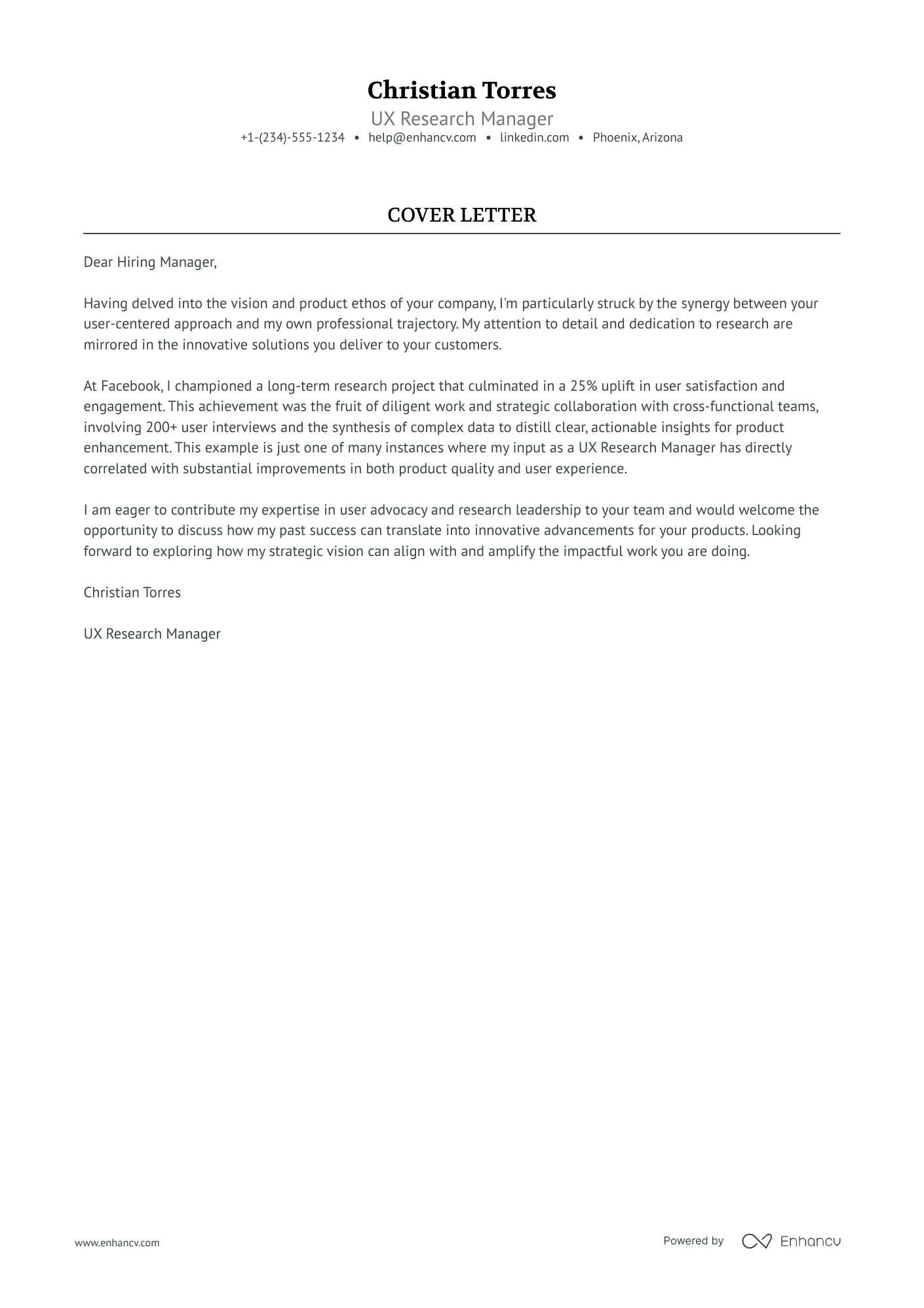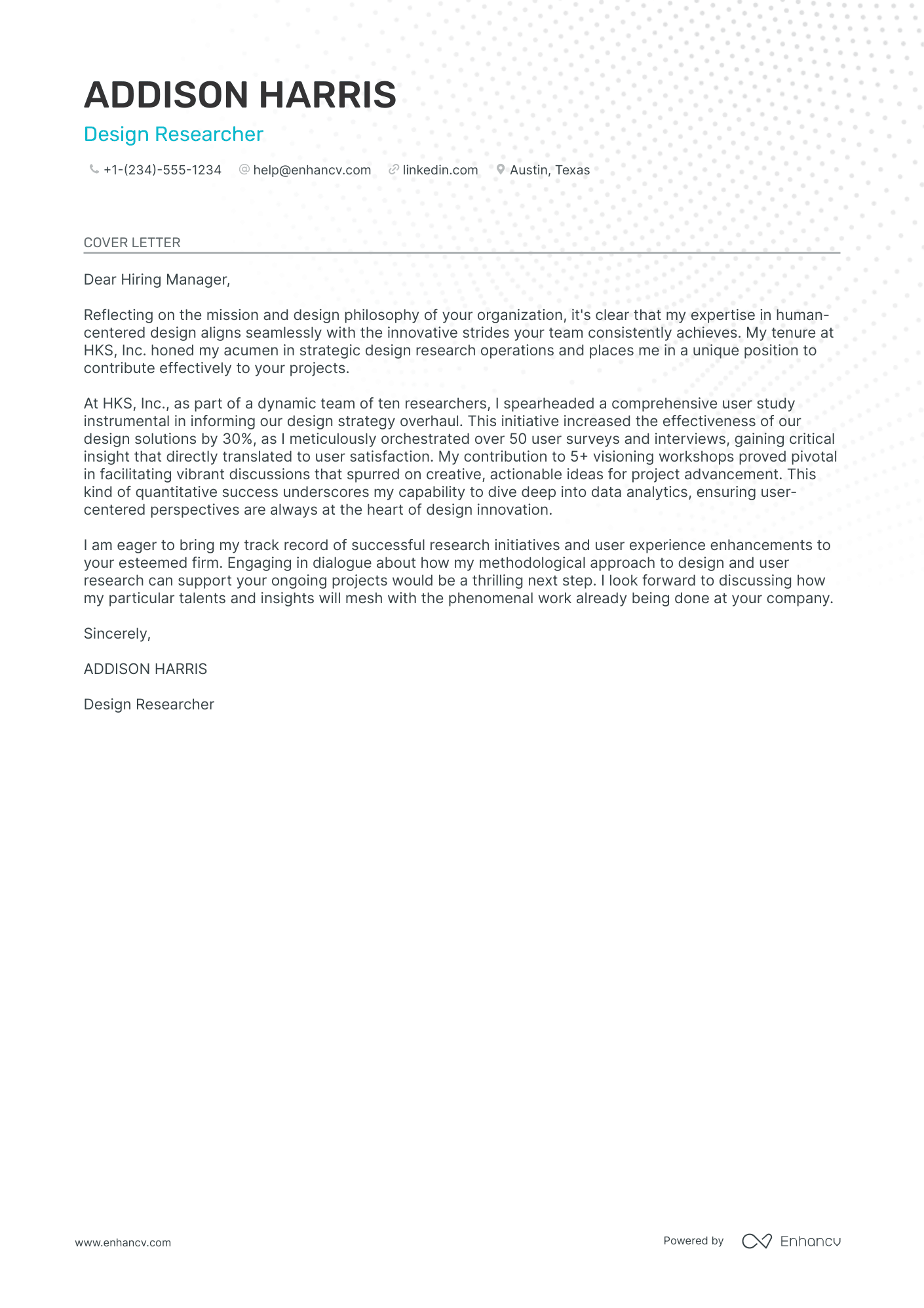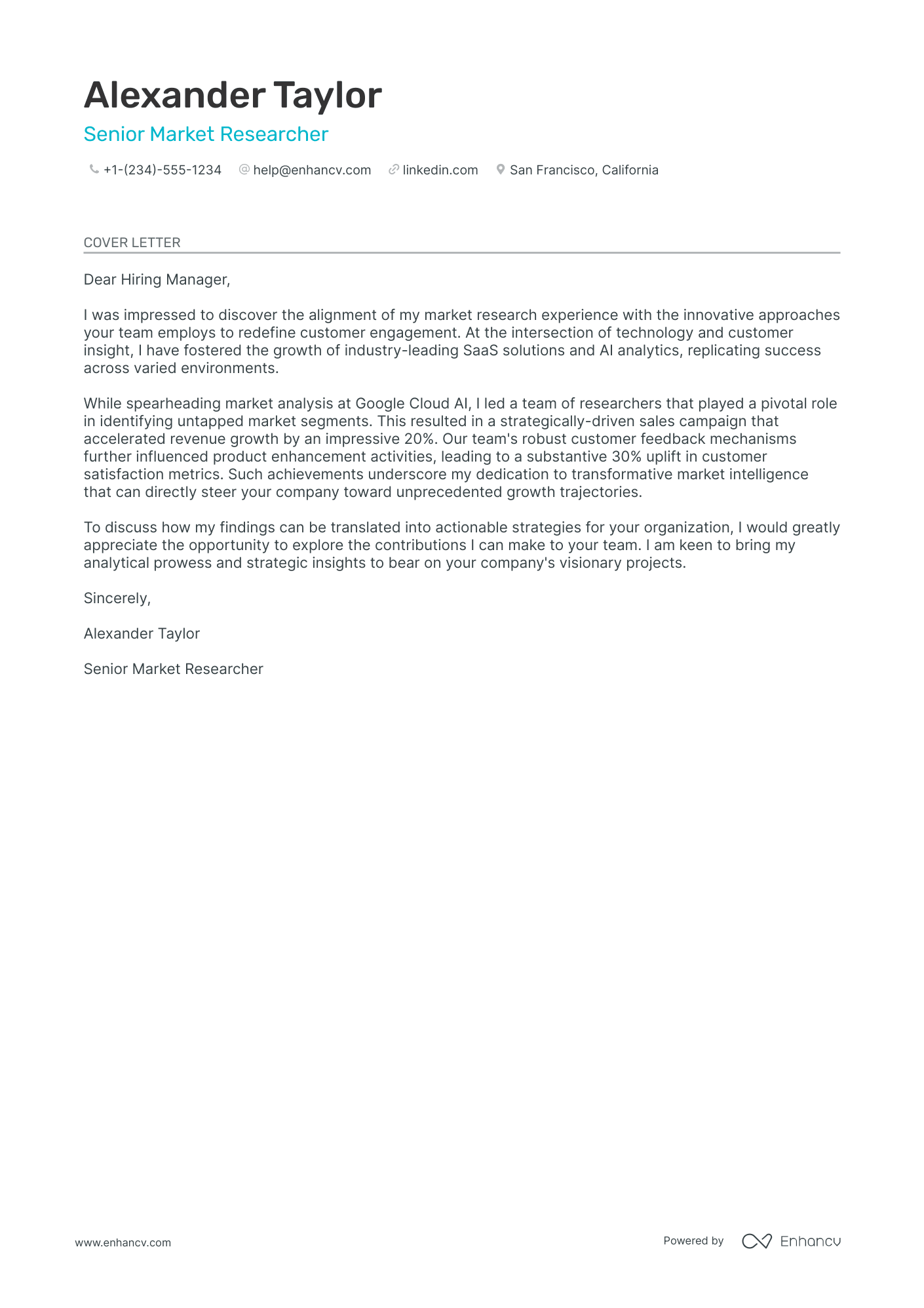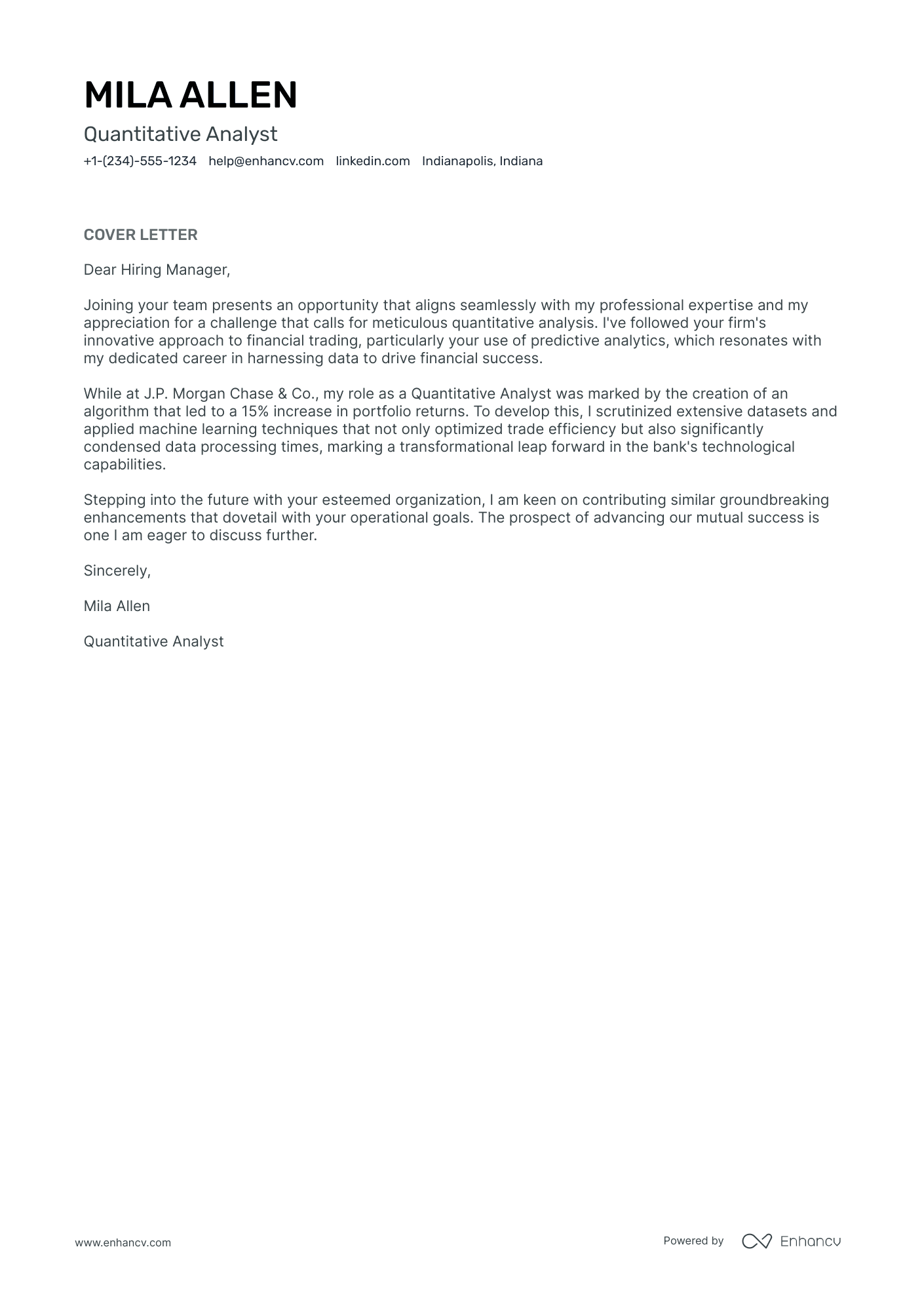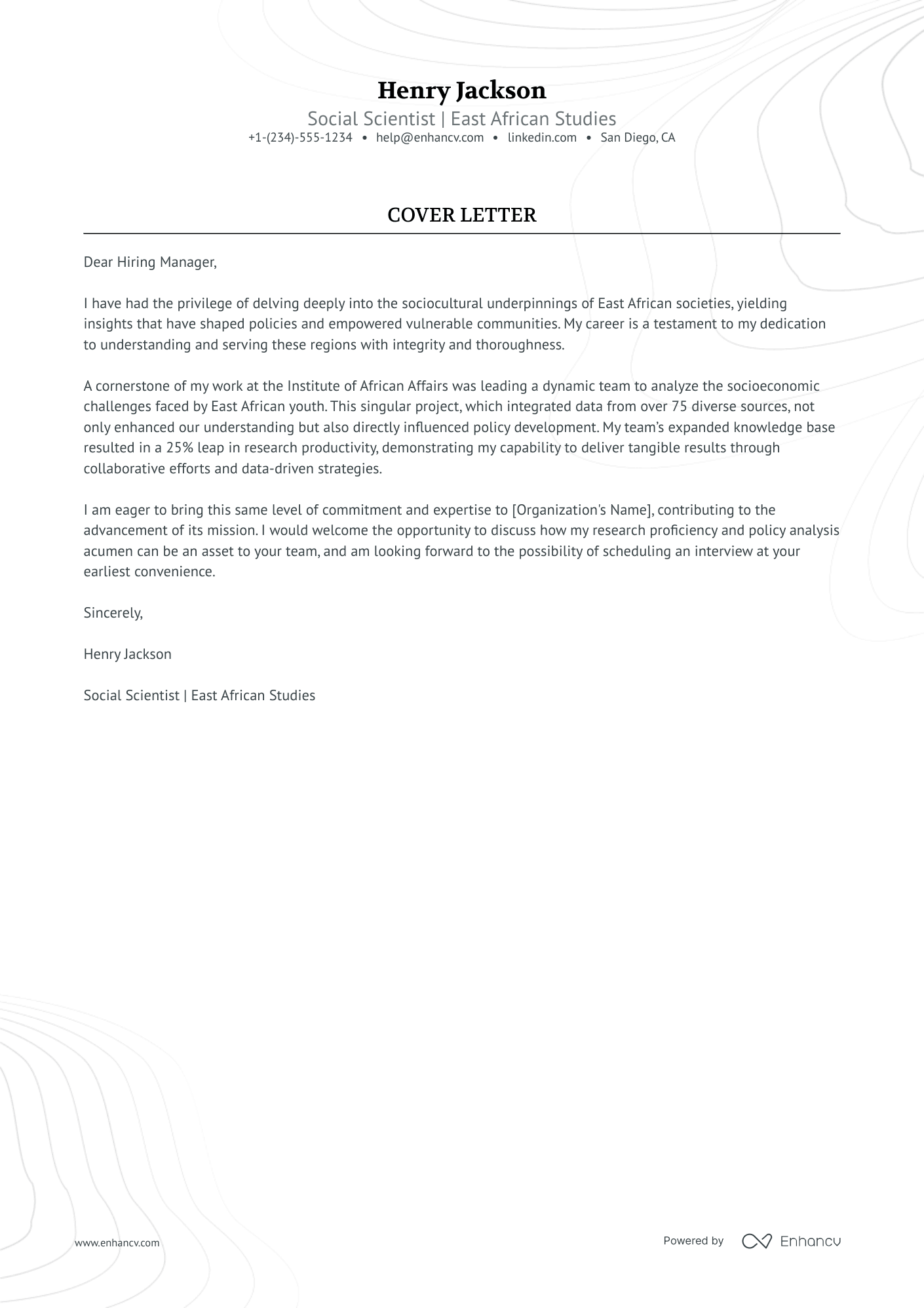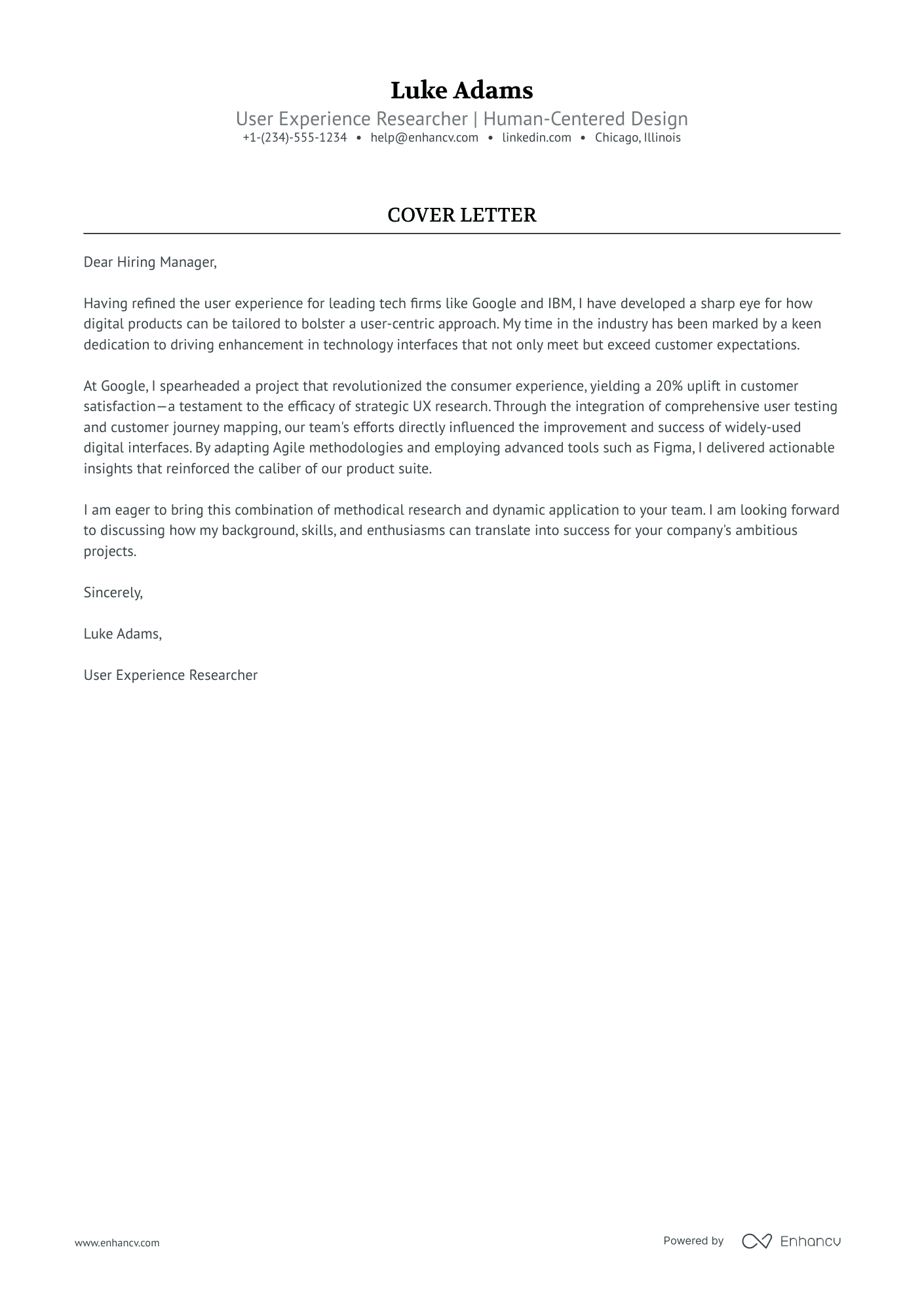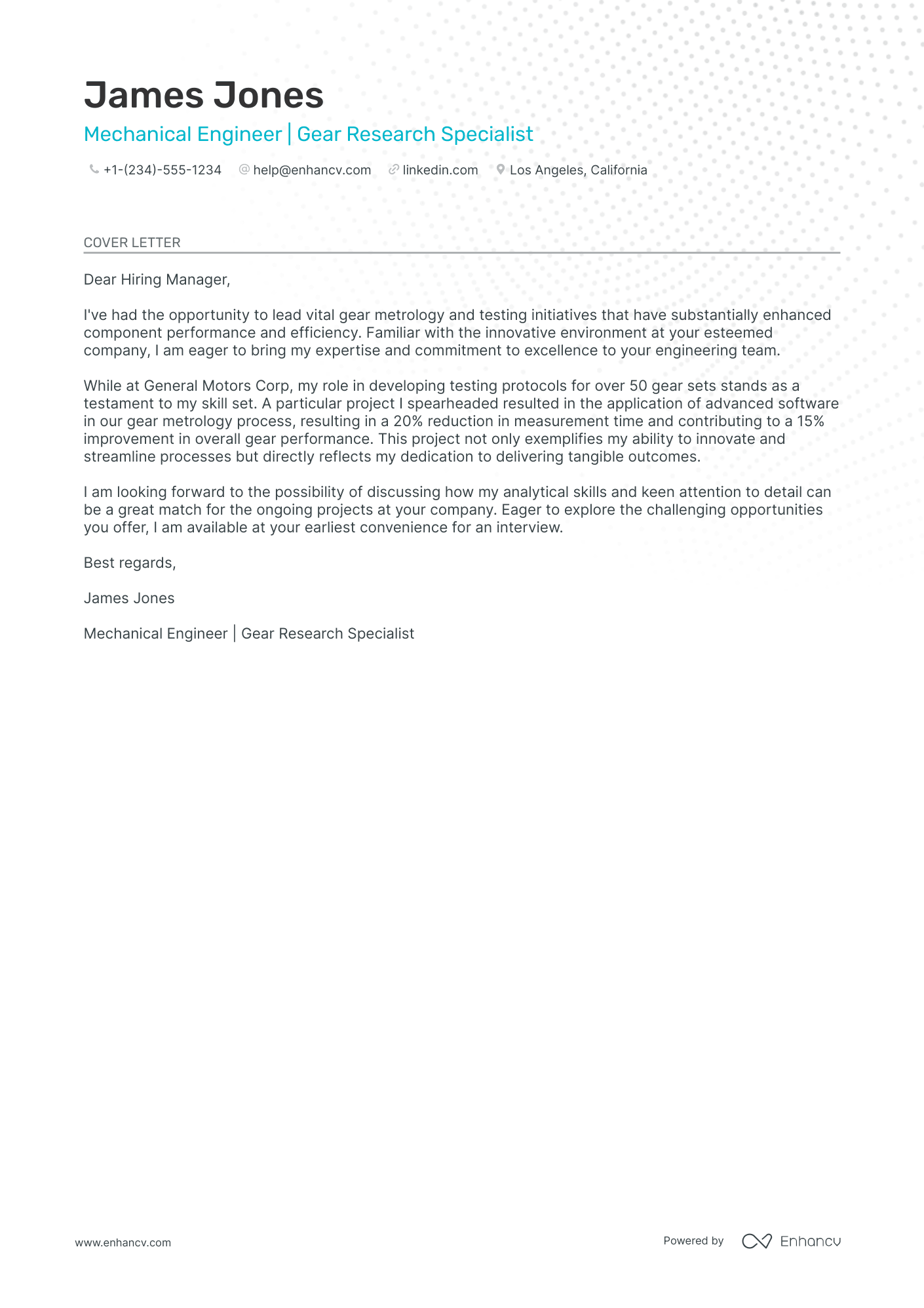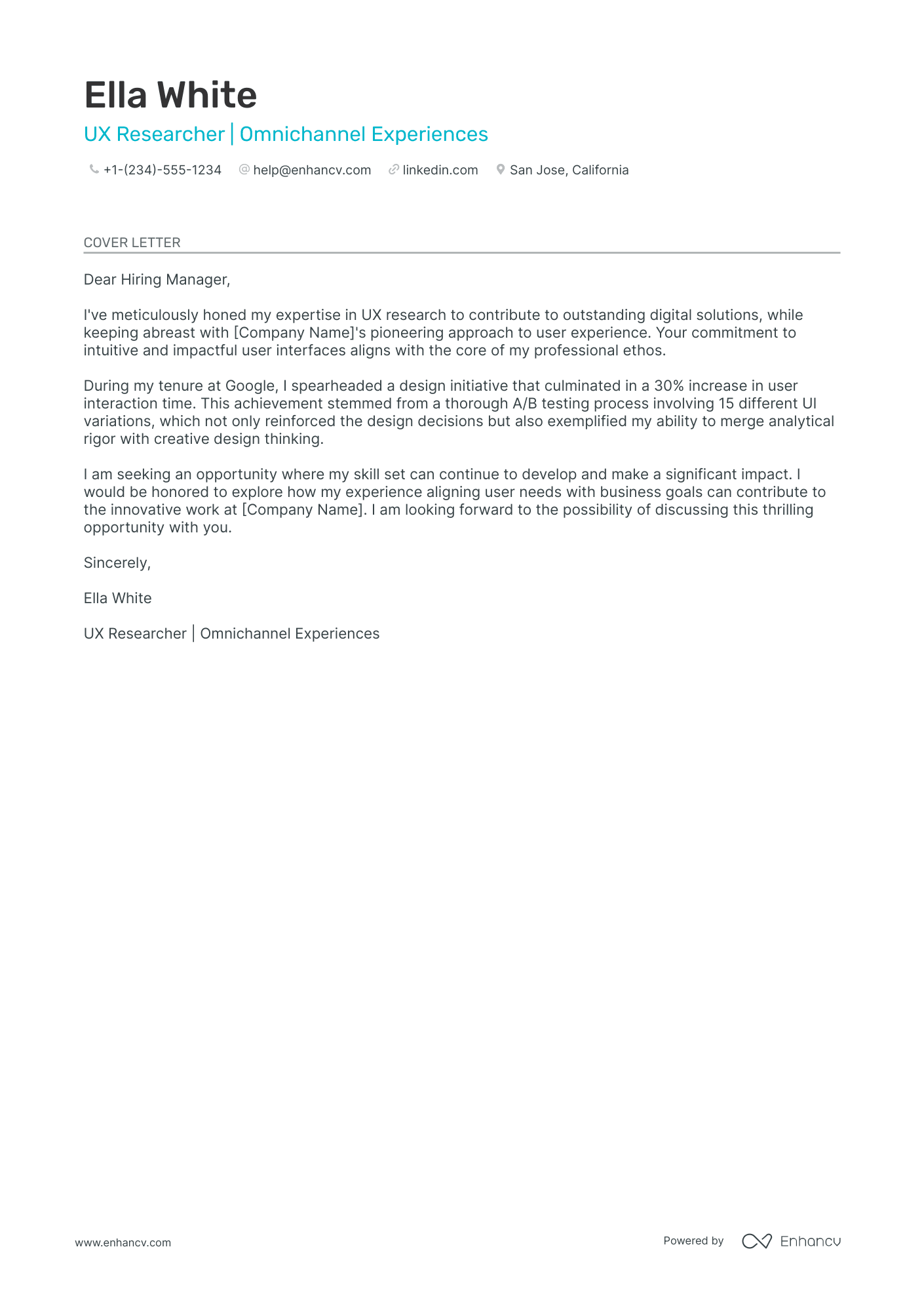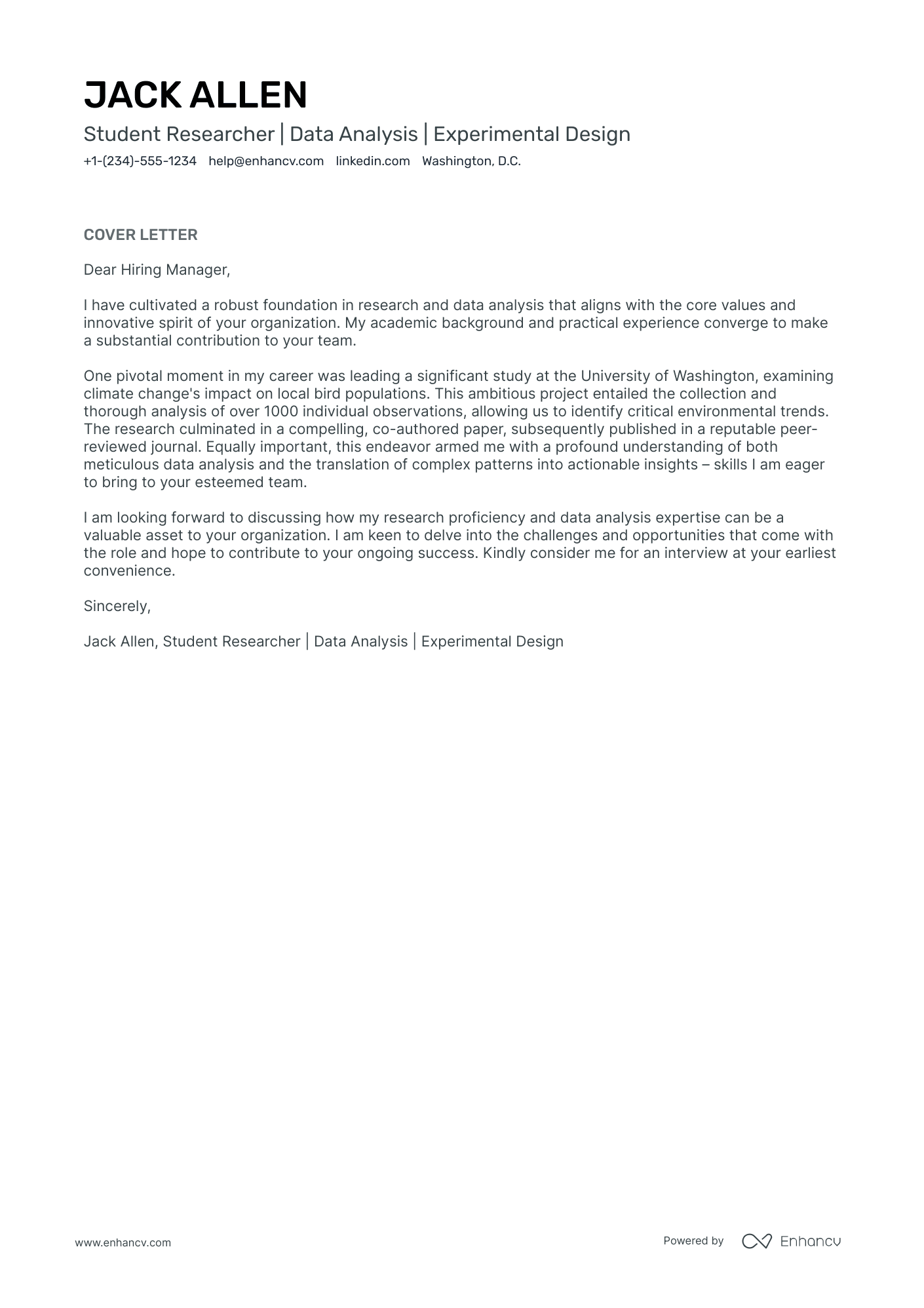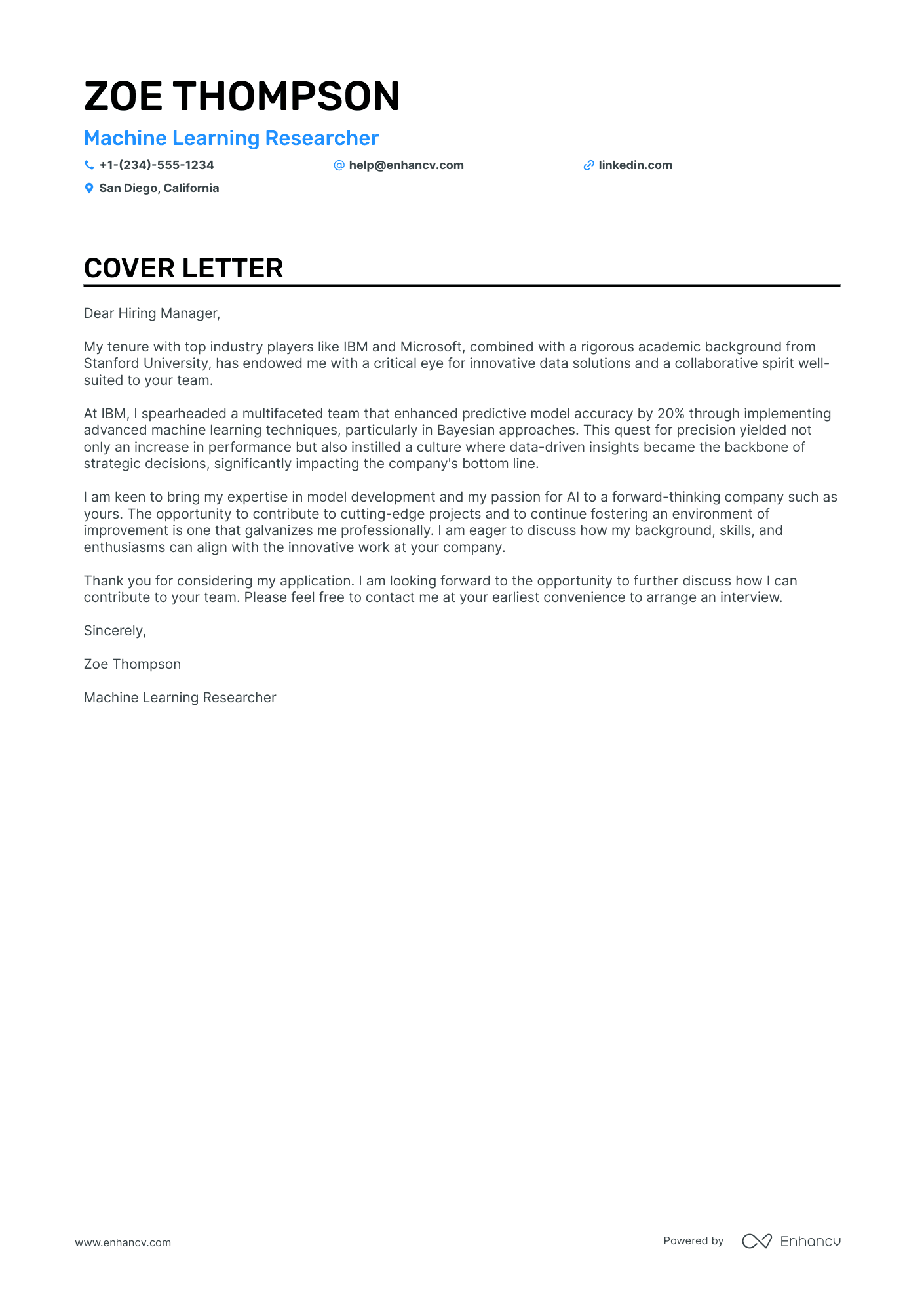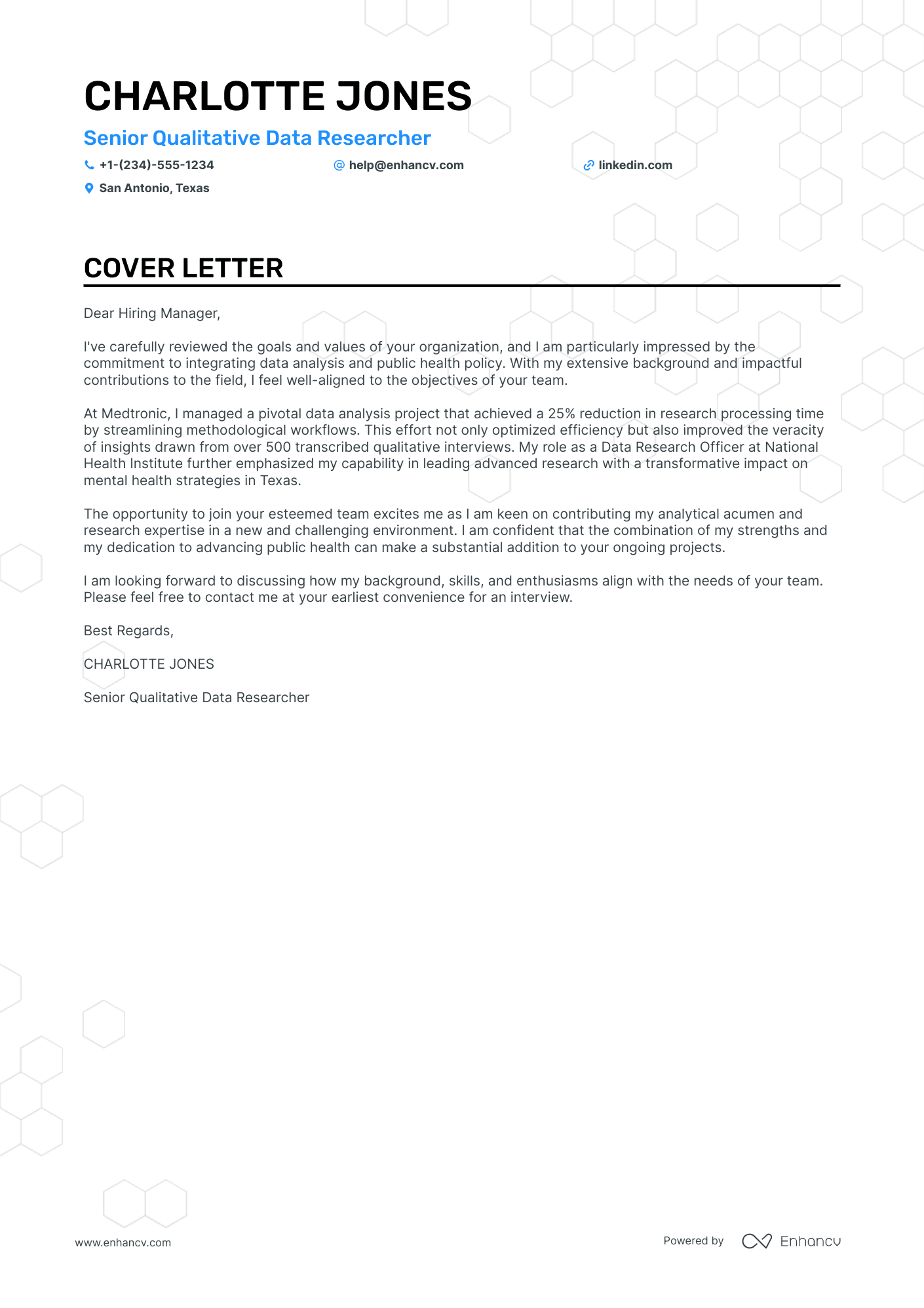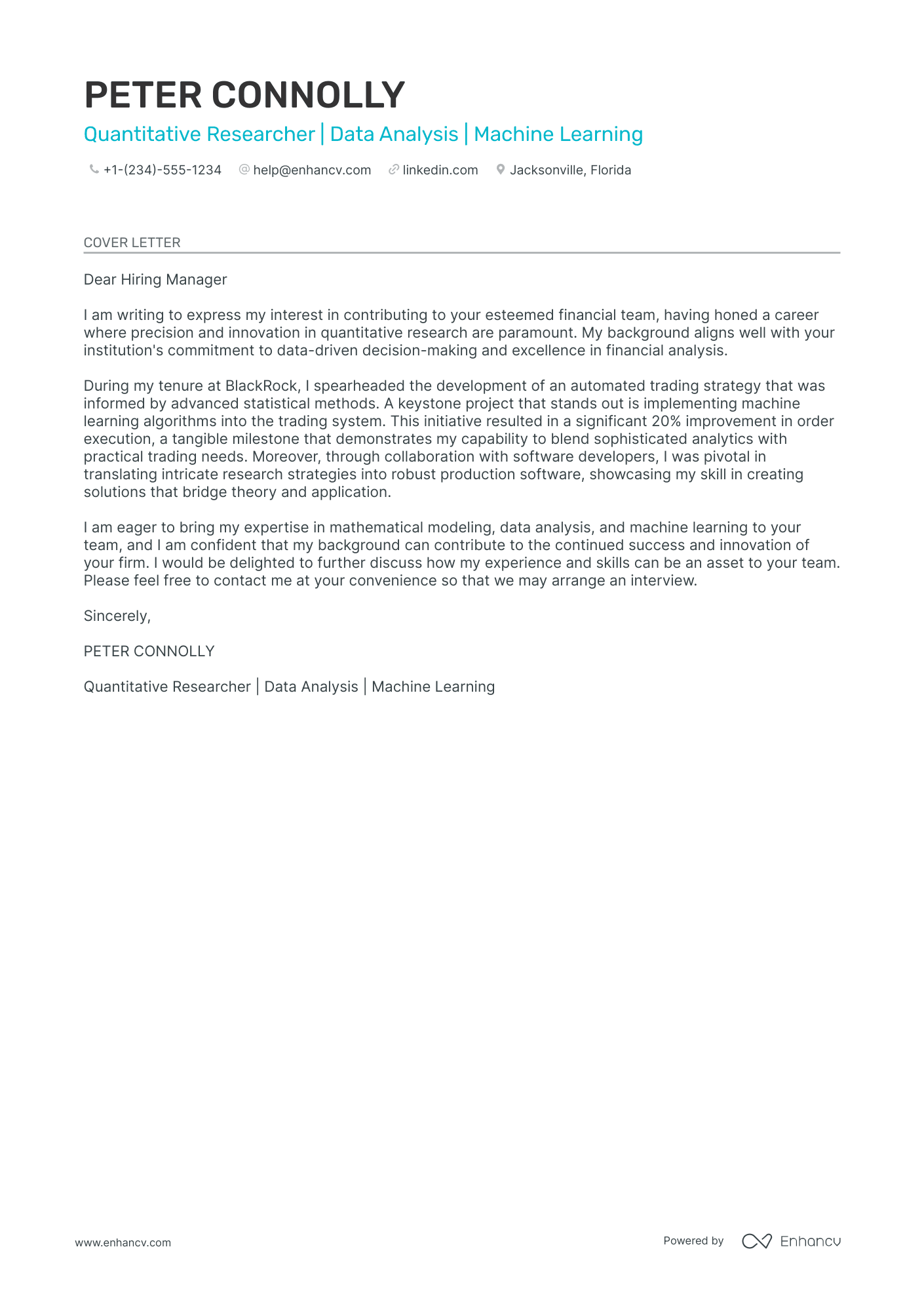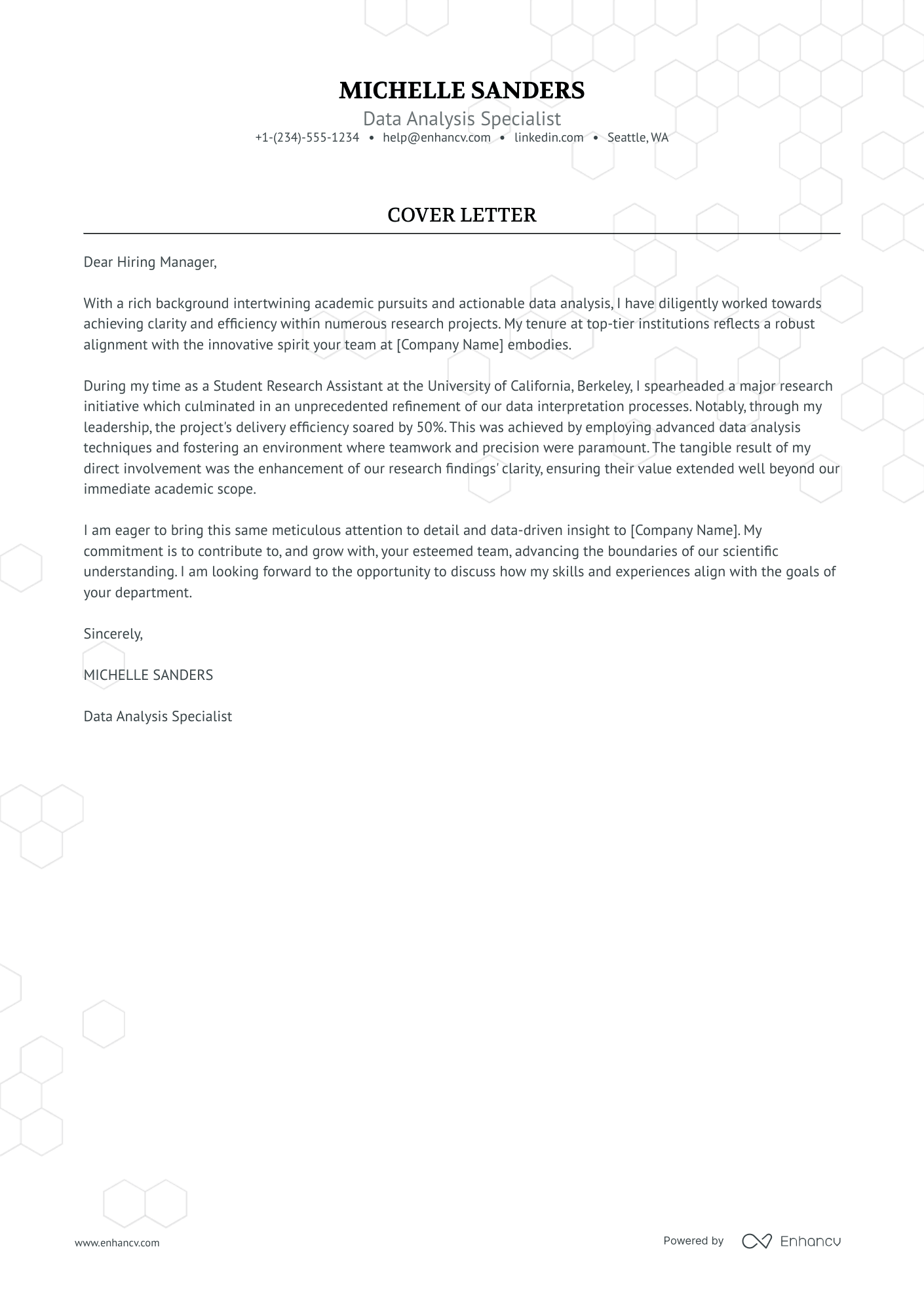Embarking on the job hunt, you’ve likely discovered the need to complement your resume with a researcher cover letter—a daunting task for many. Surpassing the routine checklist of your resume, your cover letter should weave a compelling narrative around your proudest professional milestone. It must strike the delicate balance between formal tone and original expression, avoiding overused phrases that dull your accomplishments. Keep it concise; this powerful one-pager is your chance to captivate and convince.
- Personalize the greeting to address the recruiter and your introduction that fits the role;
- Follow good examples for individual roles and industries from job-winning cover letters;
- Decide on your most noteworthy achievement to stand out;
- Format, download, and submit your researcher cover letter, following the best HR practices.
Use the power of Enhancv's AI: drag and drop your researcher resume, which will swiftly be converted into your job-winning cover letter.
If the researcher isn't exactly the one you're looking for we have a plethora of cover letter examples for jobs like this one:
- Researcher resume guide and example
- Clinical Research Assistant cover letter example
- Research Associate cover letter example
- Lab Assistant cover letter example
- Undergraduate Research Assistant cover letter example
- Lab Technician cover letter example
- Entry Level Chemist cover letter example
- Biology cover letter example
- Research Assistant cover letter example
- Scientist cover letter example
- Research Manager cover letter example
Drop your resume here or choose a file.
PDF & DOCX only. Max 2MB file size.
Researcher cover letter example
Samuel Moore
Columbus, Ohio
+1-(234)-555-1234
help@enhancv.com
- Demonstration of past experience relevant to the role, such as leading a comprehensive evaluation of digital resources, indicates the candidate's ability to perform similar tasks at Ithaka S+R.
- Quantifiable achievements in previous roles, like improving project efficiency by 25%, show the candidate's potential to add measurable value to Ithaka S+R's projects.
- Alignment with the organization's mission, seen in the candidate's expression of shared goals regarding academic growth and equity, suggests a good fit with the team and its objectives.
- Mention of specific skills, such as advanced qualitative methodologies and strategic project management, matches the skill set required for a successful researcher at Ithaka S+R.
The must-have sections and format of your researcher cover letter
When writing your researcher cover letter, keep in mind that it'll only be read by the recruiters and not the Applicant Tracker System (or software used to assess your profile). That's why you should structure your content with a/an:
- Header (apart from your contact information, include your name, the role you're applying for, and the date);
- Personalized salutation;
- Opening paragraph to win the recruiters over;
- Middle paragraph with key details;
- Closing that starts from clichés;
- Sign off (that's not mandatory).
Industry standards dictate your paragraphs to be single-spaced and to wrap your content in a one-inch margin. Designing your researcher cover letter, refer to one of our templates, which automatically takes care of the spacing and margins.
Choose the same font for your researcher cover letter as you did for your resume: the likes of Lato and Bitter would help you to stand out in a sea of cover letters in Arial or Times New Roman.
Export your whole researcher cover letter from our builder in PDF to keep the same formatting and image quality.
Let us save you time! With our free cover letter generator, you can create a professional letter instantly using your resume.
The top sections on a researcher cover letter
- Header: Include your contact information, the date, and the employer's contact information, ensuring you can be easily reached for follow-up and portraying a professional format specific to researchers who value detail orientation.
- Greeting: Address the hiring manager or committee directly, if known, to show you've done your research, which is a critical skill for any research position.
- Introduction: Clearly state the research position you're applying for, mention how you found the job listing, and include a hook that summarizes your enthusiasm and fit for the role, demonstrating your genuine interest and initiative in the field.
- Body: Detail your previous research experience, publications, and how your skills align with the job requirements, showing that you can contribute significantly to the ongoing projects or academic pursuits of the organization.
- Closing: Express your eagerness to discuss further how you can contribute to the team, thank the reader for considering your application, and indicate that you have attached your CV or any relevant publications, establishing a call-to-action and preparation for the next steps.
Key qualities recruiters search for in a candidate’s cover letter
Proven track record in conducting independent research and publishing in peer-reviewed journals: It demonstrates the ability to contribute to the scientific community with original findings.
Expertise in specialized techniques or methodologies unique to the field: This shows the candidate possesses the technical skills necessary to perform and contribute to cutting-edge research.
Successful grant writing experience: Securing funding is critical for research; this skill indicates the candidate can attract the necessary resources to support their work.
Prior involvement in collaborative projects with multidisciplinary teams: Research increasingly requires collaboration across various disciplines, so the ability to work with diverse teams is highly valued.
Evidence of critical thinking and problem-solving abilities: Researchers must be able to tackle complex problems, analyze data, and draw meaningful conclusions that propel the field forward.
Strong communication skills, both written and oral: The ability to effectively communicate research findings to a wide range of audiences, including non-specialists, is essential for disseminating knowledge and advancing one's career in academia or industry.
How to start your researcher cover letter: with a greeting, of course
Have you ever considered just how powerful a personalized salutation can be?
We sure have news for you! Your researcher cover letter should start with the right salutation to recruiters, nurturing a sense of respect and individuality.
Greet recruiters by using their first name (e.g. "Dear Tom" or "Dear Patricia") if you've previously established contact with them.
Otherwise, opt out for the less familiar, "Dear Ms. Peaches" or "Dear Ms Kelsey", if you've found the recruiter's name on LinkedIn or a corporate website.
"To whom it may concern" is never a good option, as it creates a sense that you've been sending out your researcher cover letter to anyone. Instead, use "Dear HR team" or "Dear (company name) recruiter" for a feeling of exclusivity.
List of salutations you can use
- Dear Dr. [Last Name],
- Dear Professor [Last Name],
- Dear Hiring Committee,
- Dear Search Committee,
- Dear [Full Name],
- Dear Mr./Ms. [Last Name],
Using your researcher cover letter intro to show your dedication
We know just how difficult it is to start writing your researcher cover letter introduction.
There are so many great qualities you have as a professional, which one should you choose?
How about writing up to two sentences about your passion and commitment to the work you do or are set to do?
Try to describe exactly what you enjoy about the potential role.
A positive attitude from the get-go will help you stand out as a motivated researcher professional.
Choosing your best achievement for the middle or body of your researcher cover letter
Now that you have the recruiters' attention, it's time to write the chunkiest bit of your researcher cover letter.
The body consists of three to six paragraphs that focus on one of your achievements.
Use your past success to tell a story of how you obtained your most job-crucial skills and know-how (make sure to back these up with tangible metrics).
Another excellent idea for your researcher cover letter's middle paragraphs is to shine a light on your unique professional value.
Write consistently and make sure to present information that is relevant to the role.
Finishing off your researcher cover letter with what matters most
So far, you've done a fantastic job in tailoring your researcher cover letter for the role and recruiter.
Your final opportunity to make a good impression is your closing paragraph.
And, no, a "Sincerely yours" just won't do, as it sounds too vague and impersonal.
End your researcher cover letter with the future in mind.
So, if you get this opportunity, what do you plan to achieve? Be as specific, as possible, of what value you'd bring to the organization.
You could also thank recruiters for their interest in your profile and prompt for follow-up actions (and organizing your first interview).
Researcher cover letter advice for candidates with no experience
If you're worried about writing your Researcher cover letter and have no professional experience, we sure have some advice for you.
Turn recruiters' attention to your transferable or relevant skills gained thanks to your life and work experience.
Instead of writing about past jobs, focus on one achievement (whether from your volunteering experience, education, etc.) and the skills it has helped you build.
Alternatively, you could focus your Researcher cover letter on your career objectives and goals. Always remember to make those relevant to the job you're applying for by detailing how you see yourself growing as part of the company.
Recruiters would be way more impressed with candidates who fit the job profile and can bring about plenty of skills and vision to the table.
Key takeaways
Summarizing the most important aspects in writing your researcher cover letter, remember to:
- Create a personalized researcher cover letter for each role you apply for, that includes the recruiter's name in the salutation;
- Format your researcher cover letter with single-spacing, one-inch margins, and a modern, yet ATS-friendly font;
- Always start off your researcher cover letter with two sentences that reflect what is most important about your application;
- Your researcher cover letter body should feature your biggest accomplishments and the job-relevant skills it has taught you;
- Instead of opting for the "Sincerely yours" ending, close your researcher cover letter with a nod to the future with what you aim to achieve in this potential role.
Researcher cover letter examples
By Role
